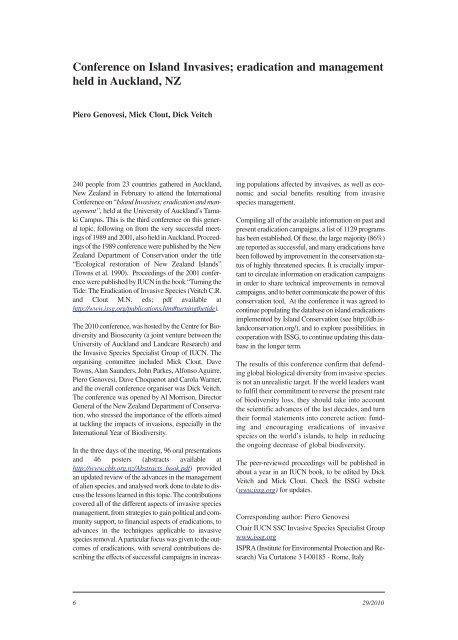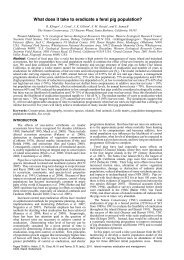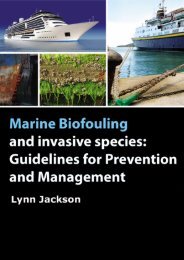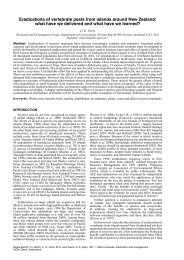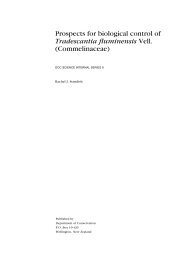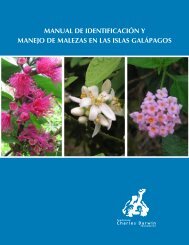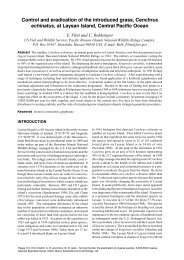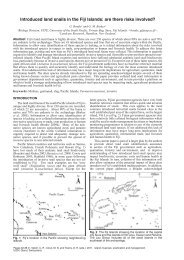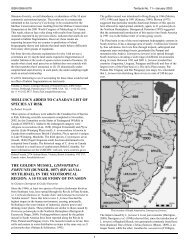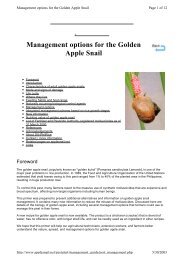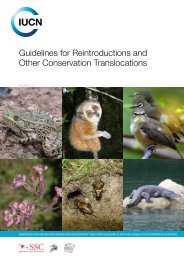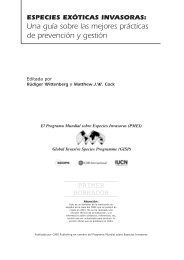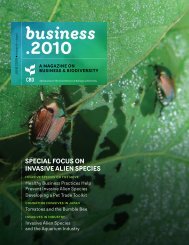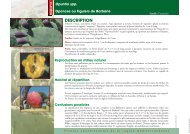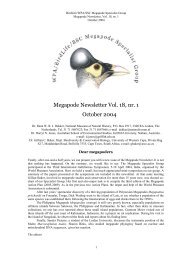Aliens Newsletter - ISSG
Aliens Newsletter - ISSG
Aliens Newsletter - ISSG
You also want an ePaper? Increase the reach of your titles
YUMPU automatically turns print PDFs into web optimized ePapers that Google loves.
Conference on Island Invasives; eradication and management<br />
held in Auckland, NZ<br />
Piero Genovesi, Mick Clout, Dick Veitch<br />
240 people from 23 countries gathered in Auckland,<br />
New Zealand in February to attend the International<br />
Conference on “Island Invasives; eradication and management”,<br />
held at the University of Auckland’s Tamaki<br />
Campus. This is the third conference on this general<br />
topic, following on from the very successful meetings<br />
of 1989 and 2001, also held in Auckland. Proceedings<br />
of the 1989 conference were published by the New<br />
Zealand Department of Conservation under the title<br />
“Ecological restoration of New Zealand Islands”<br />
(Towns et al. 1990). Proceedings of the 2001 conference<br />
were published by IUCN in the book “Turning the<br />
Tide: The Eradication of Invasive Species (Veitch C.R.<br />
and Clout M.N. eds; pdf available at<br />
http://www.issg.org/publications.htm#turningthetide).<br />
The 2010 conference, was hosted by the Centre for Biodiversity<br />
and Biosecurity (a joint venture between the<br />
University of Auckland and Landcare Research) and<br />
the Invasive Species Specialist Group of IUCN. The<br />
organising committee included Mick Clout, Dave<br />
Towns, Alan Saunders, John Parkes, Alfonso Aguirre,<br />
Piero Genovesi, Dave Choquenot and Carola Warner,<br />
and the overall conference organiser was Dick Veitch.<br />
The conference was opened by Al Morrison, Director<br />
General of the New Zealand Department of Conservation,<br />
who stressed the importance of the efforts aimed<br />
at tackling the impacts of invasions, especially in the<br />
International Year of Biodiversity.<br />
In the three days of the meeting, 96 oral presentations<br />
and 46 posters (abstracts available at<br />
http://www.cbb.org.nz/Abstracts_book.pdf) provided<br />
an updated review of the advances in the management<br />
of alien species, and analysed work done to date to discuss<br />
the lessons learned in this topic. The contributions<br />
covered all of the different aspects of invasive species<br />
management, from strategies to gain political and community<br />
support, to financial aspects of eradications, to<br />
advances in the techniques applicable to invasive<br />
species removal. Aparticular focus was given to the outcomes<br />
of eradications, with several contributions describing<br />
the effects of successful campaigns in increas-<br />
ing populations affected by invasives, as well as economic<br />
and social benefits resulting from invasive<br />
species management.<br />
Compiling all of the available information on past and<br />
present eradication campaigns, a list of 1129 programs<br />
has been established. Of these, the large majority (86%)<br />
are reported as successful, and many eradications have<br />
been followed by improvement in the conservation status<br />
of highly threatened species. It is crucially important<br />
to circulate information on eradication campaigns<br />
in order to share technical improvements in removal<br />
campaigns, and to better communicate the power of this<br />
conservation tool, At the conference it was agreed to<br />
continue populating the database on island eradications<br />
implemented by Island Conservation (see http://db.islandconservation.org/),<br />
and to explore possibilities, in<br />
cooperation with <strong>ISSG</strong>, to continue updating this database<br />
in the longer term.<br />
The results of this conference confirm that defending<br />
global biological diversity from invasive species<br />
is not an unrealistic target. If the world leaders want<br />
to fulfil their commitment to reverse the present rate<br />
of biodiversity loss, they should take into account<br />
the scientific advances of the last decades, and turn<br />
their formal statements into concrete action: funding<br />
and encouraging eradications of invasive<br />
species on the world’s islands, to help in reducing<br />
the ongoing decrease of global biodiversity.<br />
The peer-reviewed proceedings will be published in<br />
about a year in an IUCN book, to be edited by Dick<br />
Veitch and Mick Clout. Check the <strong>ISSG</strong> website<br />
(www.issg.org) for updates.<br />
Corresponding author: Piero Genovesi<br />
Chair IUCN SSC Invasive Species Specialist Group<br />
www.issg.org<br />
ISPRA(Institute for Environmental Protection and Research)<br />
Via Curtatone 3 I-00185 - Rome, Italy<br />
6 29/2010


